
Many property owners mistakenly equate boilers with furnaces. Given that both appliances deliver warmth to a residence or structure, it’s easy to see why. Yet, that’s about where their parallels conclude. While both aim to provide warmth, each has unique attributes and advantages. Discerning between a boiler vs furnace, along with their respective benefits, is essential for making the right choice tailored to your specific heating needs and configuration.
Exploring the Contrasts: Boiler Heating Systems vs. Forced-Air Furnaces
Contents
Keep reading to learn the key distinctions that set these two boiler vs furnace heating systems apart.
Understanding Boilers
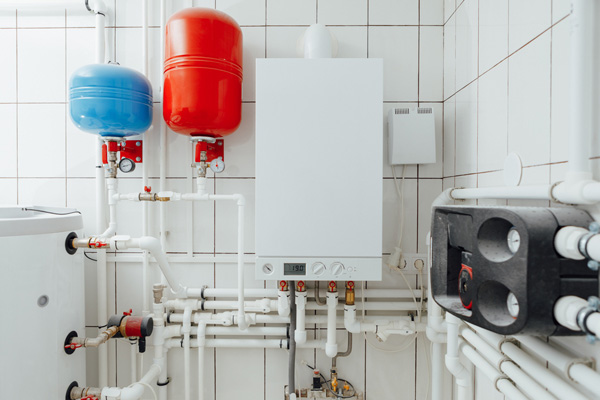
A boiler is a sizable sealed vessel designed to heat water or another liquid, producing vapor or steam. It stands as the central element in many heating setups, playing a pivotal role in both emitting and distributing warmth.
Hydronic heating or radiator system utilizes water or another liquid as the medium for warmth. Beyond just the boiler, this system includes components like baseboards, radiators, piping, and the circulator pump. These parts are strategically placed throughout various rooms and areas to ensure efficient heat distribution. Depending on the size of a residence, a residential boiler system might consist of a handful or a multitude of these elements.
Understanding Furnaces
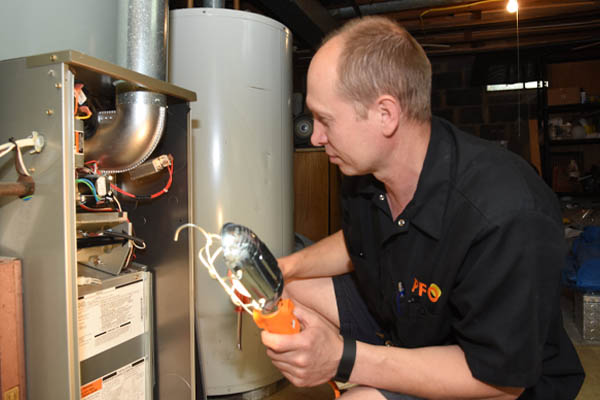
A furnace operates by using air as its heating medium. This system disperses the warmed air throughout various rooms. Often referred to as a “forced-air heating system,” it draws in cool or ambient air, heats it via a heat exchanger, and then circulates the warmed air through an HVAC ductwork system. Furnaces can be categorized into three designs: horizontal, upflow, and downflow, with fuel options ranging from oil, electricity, and gas to induction.
Comparing Boilers and Furnaces
At the core, the primary distinction between boilers and furnaces lies in their operational mechanisms. A boiler functions by warming water within its containment, subsequently propelling this hot water through a network of pipes traversing the home or structure. As this hot water courses through the pipes, they become heated, radiating warmth into the surrounding rooms. As long as the boiler can consistently generate hot water or steam, it maintains the building’s warmth.
Unlike boilers, a furnace employs a heat exchanger to warm up air instead of liquid or water. Once heated, this air is disseminated throughout the residence to provide consistent warmth. This distribution is facilitated by a blower motor, propelling the warmed air through a system of vents and ductwork.
Efficiency Showdown: Boiler vs Furnace
Given the fundamental difference between a boiler vs furnace, air requires more energy to heat than water does. Consequently, furnaces tend to burn through fuel more rapidly relative to boilers. On the financial front, while boilers might initially be more expensive, their longevity could potentially surpass that of furnaces. However, the lifespan of both systems largely hinges on their maintenance and upkeep.
Boiler: Advantages & Drawbacks
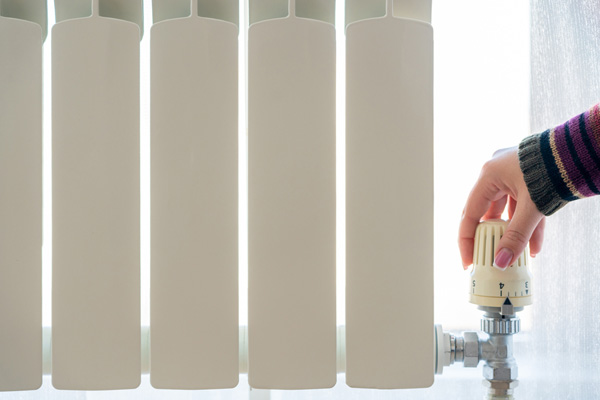
Dive into the benefits and limitations associated with boilers:
Advantages
- Efficiency: Boilers typically consume less fuel, translating to potential energy cost savings.
- Quiet Operation: Without the need to push hot air around, boilers generally operate with reduced noise compared to furnaces.
- Consistent Warmth: The heat from hot water or steam offers more uniform warmth than its air-based counterpart.
- Improved Air Quality: Since boilers don’t circulate air in the same way furnaces do, they’re less likely to spread dust, pollen, and other airborne particles.
Drawbacks
- Heat Only: While boilers efficiently warm your home, they lack cooling capabilities. Though furnaces can’t cool either, their ductwork can be adapted for central cooling systems.
- Installation Complexities: Setting up a boiler demands more time and labor compared to other heating systems.
- Delayed Temperature Adjustments: Boilers might not respond swiftly to thermostat changes, leading to a lag in reaching the desired temperature.
- Potential for Leaks: Especially in older or compromised units, boilers carry a risk of water or fluid leaks, posing potential damage concerns.
- Challenging Conversion: Shifting from a boiler setup to a furnace-based system can be cumbersome and costly, primarily due to the need for ductwork installation.
Furnace: Advantages & Drawbacks
Let’s weigh the benefits and limitations of using furnaces:
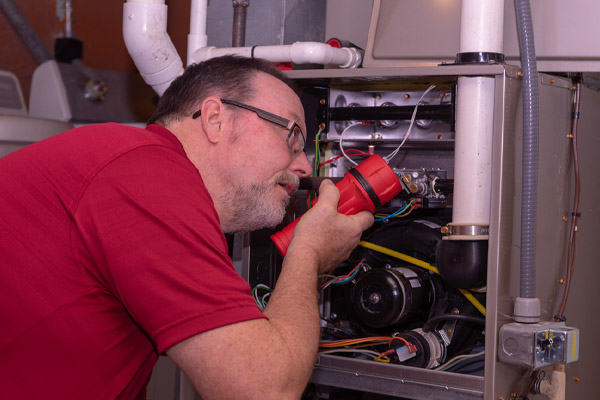
Advantages
- Diverse Fuel Options: Furnaces have the flexibility to run on electricity, natural gas, heating oil, or propane. Additionally, there are select models powered by solar or geothermal sources, albeit rare.
- Quick Heat Generation: Furnaces can rapidly produce heat, ensuring homes achieve the desired warmth faster than boilers.
- Affordability: Due to their prevalence, a wide variety of furnace models exist, promoting competitive pricing.
- Reduced Damage Risks: In the event of a leak, furnaces release air rather than water or fluid, minimizing potential harm to homes.
- No Freezing Concerns: Furnace users in frigid climates don’t have to worry about the hazards of frozen and potentially bursting pipes, unlike boiler systems that depend on water for heating.
Drawbacks
- Operational Noise: The blower mechanism in furnaces emits sound during air circulation, leading to audible disturbances every time the system is activated.
- Inconsistent Warmth: Heated air doesn’t offer the uniform warmth that hot water or steam does, which can result in varying room temperatures.
- Air Quality Concerns: Neglecting regular maintenance or replacement of air filters can compromise the indoor air quality, potentially affecting inhabitants’ well-being.
Conclusion
Ultimately, the decision to opt for a boiler or a furnace hinges on your specific heating preferences and the current infrastructure of your home. Those transitioning from older systems can take comfort in the fact that modern boilers and furnaces boast impressive efficiency ratings, paving the way for long-term cost savings. If you find yourself wavering between the two, reaching out to a local HVAC expert can provide insightful recommendations tailored to your needs.
Call PFO Heating & Air Conditioning For All Of Your HVAC Needs
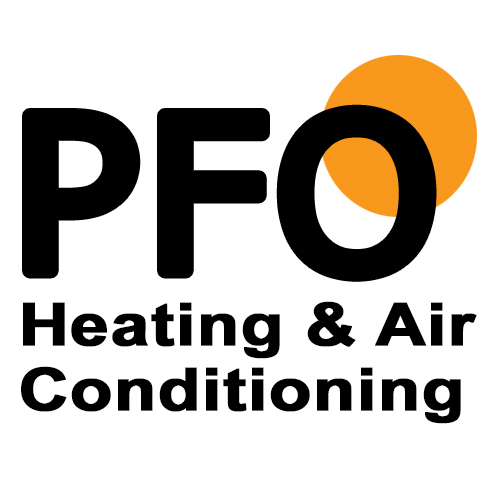
PFO Heating & Air Conditioning delivers top-tier heating and cooling services in the Greater Princeton, NJ area. We employ only the finest certified technicians equipped to provide outstanding HVAC tune-ups, repairs, installations, and replacements. Each technician on our team possesses the expertise and know-how to service your HVAC system to the highest standard.
PFO Heating & Air Conditioning promises the most competitive rates for heating and cooling services in the area. Our maintenance solutions can enhance your comfort, bolster energy efficiency, and curtail your home’s heating and cooling expenses. Should you find yourself in need of an HVAC repair or a new system, we can propose the optimal fit for your residence, all while being mindful of your budget. We stand by all the work we undertake, pledging your complete satisfaction. To arrange a service appointment, contact PFO Heating & Air Conditioning today. We’re pleased to offer complimentary, in-home quotations.
Click here to contact us now or call us at (800) 253-9001 to find out more! Click the link to view our service area.
Related Articles:



